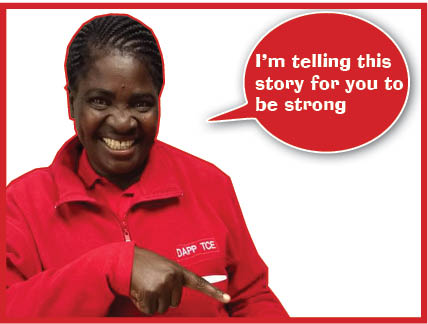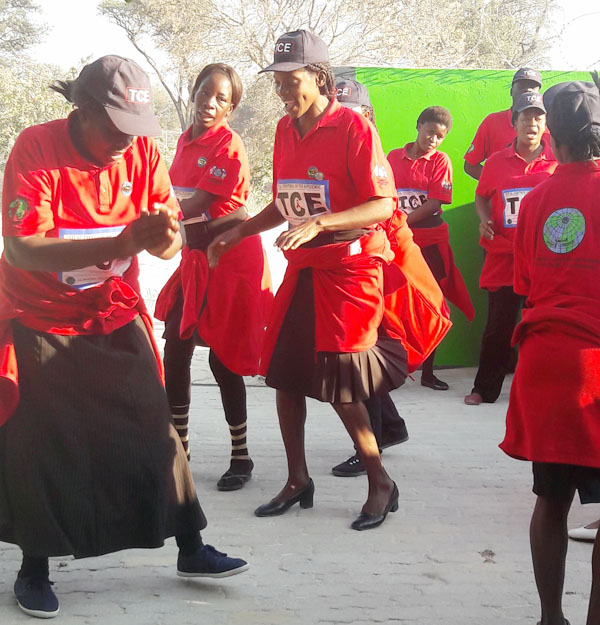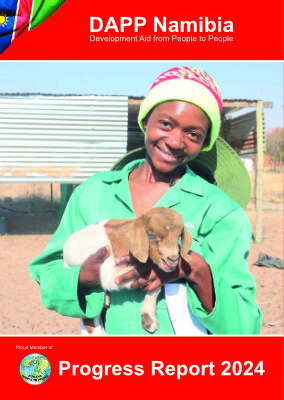
Josephine, a DAPP TCE field officer from Katima Mulilo, tells a powerful story about her experience of being HIV positive and of how she is working to help others, explaining “I’m telling this story for you to be strong. I want you to be strong”.
Every year in Namibia, over 6400 people are infected with HIV and there are more than 3000 HIV/AIDS-related deaths. More than one in ten people in Namibia are infected with HIV. Each of these people has a story to tell. One of these stories is Josephine’s story.
Josephine tested HIV positive when she was 41 years old. When she started to feel sick, she was afraid but she knew she had to get tested, explaining that whether she liked it or not, she knew the virus was there. Once diagnosed, she spoke of how “it was heavy at first” to tell her family and her friends, but day by day it became easier. She has come a long way since her diagnosis, first coming to accept her diagnosis and learning to manage her treatment regimen and to always take her medication, then becoming a “passionate” for DAPP (a volunteer who supports the work of DAPP field officers) and finally becoming a field officer for DAPP. She is now able to say with confidence, “it’s in me but it won’t kill me.... I’m walking with confidence, I’m proud; my positive must be my positive only”.
Josephine’s story is one of personal growth but she was not the only person in her family to be infected with the HIV virus and not every story ends well. Josephine spoke of how her daughter was also diagnosed as HIV positive. However her daughter did not tell anyone and she did not stay on her medication. Sadly she died when her child, Josephine’s granddaughter, was just 2 months old. Josephine believes she lost her daughter because her daughter did not tell anyone that she was HIV positive, and so when she stopped taking her medication, there was nobody to support her and to encourage her. Perhaps it is no surprise that today Josephine works most closely with young women, encouraging them to know their HIV status, and if they are HIV positive, to stay on treatment. For everyone she works with, she encourages them to accept their condition, explaining that “the more you talk about it, the more the fear will go away”.
As a field officer, Josephine’s office is her community and her work is to increase the number of people tested, to link people identified as positive to care, and to help trace people lost to follow up. She spoke of how she encourages HIV positive mothers to stay on their treatment regimen and to start their infants on treatment so that the virus is not passed from mother to child during birth or through breastfeeding. She tells the women “we will be with you until the day we go and celebrate” and she means it. She supports the women to maintain their treatment regimen during breastfeeding and makes sure they bring their children for HIV testing at birth, at 6 weeks, at 9 months and at 18 months. If a mother misses her appointment, Josephine goes into the community to find her, to see what may have happened and to encourage the mother to visit the clinic. Finally, when the infants reach 18 months of age, are tested and confirmed HIV negative, Josephine celebrates the success of this milestone with the mothers. This is a celebration of courage, time, effort and teamwork. In the x years that she has been a field officer, none of the women she has worked with have transferred the virus to their babies but if she does find HIV positive infants, she works with the mother to get the baby on treatment and supports mother and child to stay on treatment.

Josephine’s story is one of learning to accept her status and becoming stronger because of it; of seeking treatment for the virus and staying on her medication; it is a story of losing a loved one but learning to keep going. It is a story of love, of caring for her community. One of the people listening to Josephine’s story summarized this, saying that “it takes a lot of heart to prevent another young person from getting infected with HIV – it is that heart that will control the epidemic”. Her heart is telling her story so that you can be strong, so that you can get tested, and that if you are HIV positive, you stay on your medication, you seek support and you live a normal life.
|
If you would like to be tested for HIV, you can visit your local clinic. If you test positive for HIV your healthcare provider will tell you about the treatment you need. He or she may also be able to put you in contact with groups in your region who can support you.
If you are pregnant and you are HIV positive, your local healthcare provider will give you medication and more information about how you can prevent the transmission of the virus to your unborn child.
If you would like to learn more about DAPP or to find out if DAPP works in your area, contact……
|



